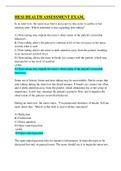HESI HEALTH ASSESSMENT EXAM,
In an interview, the nurse may find it necessary to take notes to aid his or her
memory later. Which statement is true regarding note-taking?
A) Note-taking may impede the nurse's observation of the patient's nonverbal
behaviors.
B) Note-taking allows the patient to continue at his or her own pace as the nurse
records what is said.
C) Note-taking allows the nurse to shift attention away from the patient, resulting
in an increased comfort level.
D) Note-taking allows the nurse to break eye contact with the patient, which may
increase his or her level of comfort.
(ANS-
A) Note-taking may impede the nurse's observation of the patient's nonverbal
behaviors.
Some use of history forms and note-taking may be unavoidable. But be aware that
note-taking during the interview has disadvantages. It breaks eye contact too often,
and it shifts attention away from the patient, which diminishes his or her sense of
importance. It also may interrupt the patient's narrative flow, and it impedes the
observation of the patient's nonverbal behavior.
During an interview, the nurse states, "You mentioned shortness of breath. Tell me
more about that." Which verbal skill is used with this statement?
A) Reflection
B) Facilitation
C) Direct question
D) Open-ended question
(ANS-
D) Open-ended question
The open-ended question asks for narrative information. It states the topic to be
discussed but only in general terms. The nurse should use it to begin the interview,
,to introduce a new section of questions, and whenever the person introduces a new
topic.
A nurse is taking complete health histories on all of the patients attending a
wellness workshop. On the history form, one of the written questions asks, "You
don't smoke, drink, or take drugs, do you?" This question is an example of:
A) talking too much.
B) using confrontation.
C) using biased or leading questions.
D) using blunt language to deal with distasteful topics.
(ANS-
C) using biased or leading questions.
This is an example of using leading or biased questions. Asking, "You don't
smoke, do you?" implies that one answer is "better" than another. If the person
wants to please someone, he or she is either forced to answer in a way
corresponding to their implied values or is made to feel guilty when admitting the
other answer.
During an interview, a parent of a hospitalized child is sitting in an open position.
As the interviewer begins to discuss his son's treatment, however, he suddenly
crosses his arms against his chest and crosses his legs. This would suggest that the
parent is:
A) just changing positions.
B) more comfortable in this position.
C) tired and needs a break from the interview.
D) uncomfortable talking about his son's treatment.
(ANS-
D) uncomfortable talking about his son's treatment.
Note the person's position. An open position with the extension of large muscle
groups shows relaxation, physical comfort, and a willingness to share information.
A closed position with the arms and legs crossed tends to look defensive and
,anxious. Note any change in posture. If a person in a relaxed position suddenly
tenses, it suggests possible discomfort with the new topic.
5. The nurse is interviewing a patient who has a hearing impairment. What
techniques would be most beneficial in communicating with this patient?
A) Determine the communication method he prefers.
B) Avoid using facial and hand gestures because most hearing-impaired people
find this degrading.
C) Request a sign language interpreter before meeting with him to help facilitate
the communication.
D) Speak loudly and with exaggerated facial movement when talking with him
because this helps with lip reading.
(ANS-
A) Determine the communication method he prefers.
The nurse should ask the deaf person the preferred way to communicate—by
signing, lip reading, or writing. If the person prefers lip reading, then the nurse
should be sure to face him or her squarely and have good lighting on the nurse's
face. The nurse should not exaggerate lip movements because this distorts words.
Similarly, shouting distorts the reception of a hearing aid the person may wear. The
nurse should speak slowly and should supplement his or her voice with appropriate
hand gestures or pantomime.
6. The nurse is performing a health interview on a patient who has a language
barrier, and no interpreter is available. Which is the best example of an appropriate
question for the nurse to ask in this situation?
A) "Do you take medicine?"
B) "Do you sterilize the bottles?"
C) "Do you have nausea and vomiting?"
D) "You have been taking your medicine, haven't you?"
(ANS-
A) "Do you take medicine?"
, In a situation where there is a language barrier and no interpreter available, use
simple words avoiding medical jargon. Avoid using contractions and pronouns.
Use nouns repeatedly and discuss one topic at a time.
7. A female patient does not speak English well, and the nurse needs to choose an
interpreter. Which of the following would be the most appropriate choice?
A) A trained interpreter
B) A male family member
C) A female family member
D) A volunteer college student from the foreign language studies department
(ANS-
A) A trained interpreter
whenever possible, the nurse should use a trained interpreter, preferably one who
knows medical terminology. In general, an older, more mature interpreter is
preferred to a younger, less experienced one, and the same gender is preferred
when possible.
8. The nurse is conducting an interview. Which of these statements is true
regarding open-ended questions? Select all that apply.
A) They elicit cold facts.
B) They allow for self-expression.
C) They build and enhance rapport.
D) They leave interactions neutral.
E) They call for short one- to two-word answers.
F) They are used when narrative information is needed.
(ANS-
B) They allow for self-expression.
C) They build and enhance rapport.
F) They are used when narrative information




